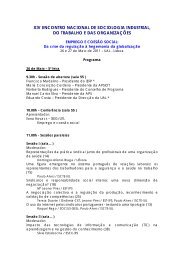Web-based Learning Solutions for Communities of Practice
Web-based Learning Solutions for Communities of Practice
Web-based Learning Solutions for Communities of Practice
You also want an ePaper? Increase the reach of your titles
YUMPU automatically turns print PDFs into web optimized ePapers that Google loves.
which will ultimately influence the way the students<br />
socially develop and cognitively grow. Constructive<br />
feedback is an element <strong>of</strong> the humanistic<br />
approach <strong>of</strong> social learning. It gives the e-learner<br />
an opportunity to review, contrast and compare<br />
the work he or she has delivered (particularly in<br />
writing assignments), make a connection and seize<br />
the opportunity towards unlimited potential in the<br />
application <strong>of</strong> knowledge. As an element <strong>of</strong> the<br />
social learning theory, e-feedback can there<strong>for</strong>e<br />
be seen as a feature <strong>of</strong> social presence as well as<br />
interpersonal communication in an online community<br />
<strong>of</strong> practice, all <strong>of</strong> which influence the<br />
cognitive and social development <strong>of</strong> the student.<br />
Being modeled by the online facilitator, quality<br />
e-feedback produces a collaborative atmosphere<br />
<strong>of</strong> social learning within a virtual community <strong>of</strong><br />
practice, such as an online class room.<br />
ISSUES, CONTROVERSIES,<br />
AND PROBLEMS<br />
Rationale <strong>for</strong> Quality<br />
e-Feedback as an Element <strong>of</strong><br />
Social <strong>Learning</strong> Theory<br />
The depth and interest in meaningful e-feedback<br />
grew from my experience as an e-facilitator and<br />
Faculty Manager (some <strong>of</strong> which I held in an<br />
adjunct capacity) <strong>for</strong> five different universities.<br />
Some <strong>of</strong> the online universities which I taught<br />
at had different requirements <strong>for</strong> feedback on<br />
assignments. As most <strong>of</strong> the e-universities or<br />
online programs did not set feedback standards;<br />
it led me to feel that it was not placed at the same<br />
level <strong>of</strong> importance as being present in online<br />
discussions.<br />
Interesting enough, I observed that students<br />
began sending me emails to thank me <strong>for</strong> taking<br />
the time to give them such indepth and constructive<br />
feedback on their assignments. Moreover,<br />
students commented on how much they have<br />
learned from the feedback, and how they can<br />
4<br />
The Impact <strong>of</strong> Quality E-Feedback as an Element <strong>of</strong> Social <strong>Learning</strong> Theory<br />
apply it in the future not only to improve their<br />
academic work, but also in their workplace. To<br />
my surprise, I learned from some <strong>of</strong> the students<br />
that this was the first time they have received such<br />
meaningful feedback.<br />
Furthermore, in my position as a Faculty<br />
Manager, I observed that e-facilitators were giving<br />
various degrees <strong>of</strong> feedback to students. I was<br />
surprised to learn that there was neither consistency<br />
nor standards applied when giving feedback<br />
to students, and that the quality <strong>of</strong> e-feedback<br />
did not appear to be a priority at the time. I then<br />
wondered how the various degrees <strong>of</strong> e-feedback<br />
affected the students’ learning outcome and how<br />
e-feedback was related to social learning in a<br />
virtual community <strong>of</strong> practice as a whole. How<br />
could this be assessed and measured? What could<br />
be put in place to consistently maintain the highest<br />
quality <strong>of</strong> e-feedback as a social learning tool in<br />
an online community <strong>of</strong> practice?<br />
In my capacity as a full-time pr<strong>of</strong>essor and<br />
Faculty Manager, I became aware <strong>of</strong> a pressing<br />
need <strong>for</strong> consistent quality e-feedback and its ties<br />
to social learning in a virtual community <strong>of</strong> practice,<br />
such as the online classroom. I also became<br />
conscious <strong>of</strong> the fact that providing students with<br />
quality e-feedback may be equally important as the<br />
presence <strong>of</strong> the e-facilitator in online discussions,<br />
especially when a solid quality learning outcome<br />
is concerned. Implementing the social learning<br />
theory element <strong>of</strong> quality e-feedback may just be<br />
a wonderful quality improvement tool that will<br />
place accountability and responsibility on both<br />
the e-pr<strong>of</strong>essor/e-facilitator and the e-educational<br />
institution and organization, or virtual community<br />
<strong>of</strong> practice, towards meeting the new demands <strong>of</strong><br />
quality made by its customers.<br />
Context <strong>of</strong> the Study<br />
U21Global is a joint venture between a consortium<br />
<strong>of</strong> Universitas 21 and Manipal Education, which<br />
delivers a number <strong>of</strong> online learning graduate programs.<br />
The U21 member universities participating



